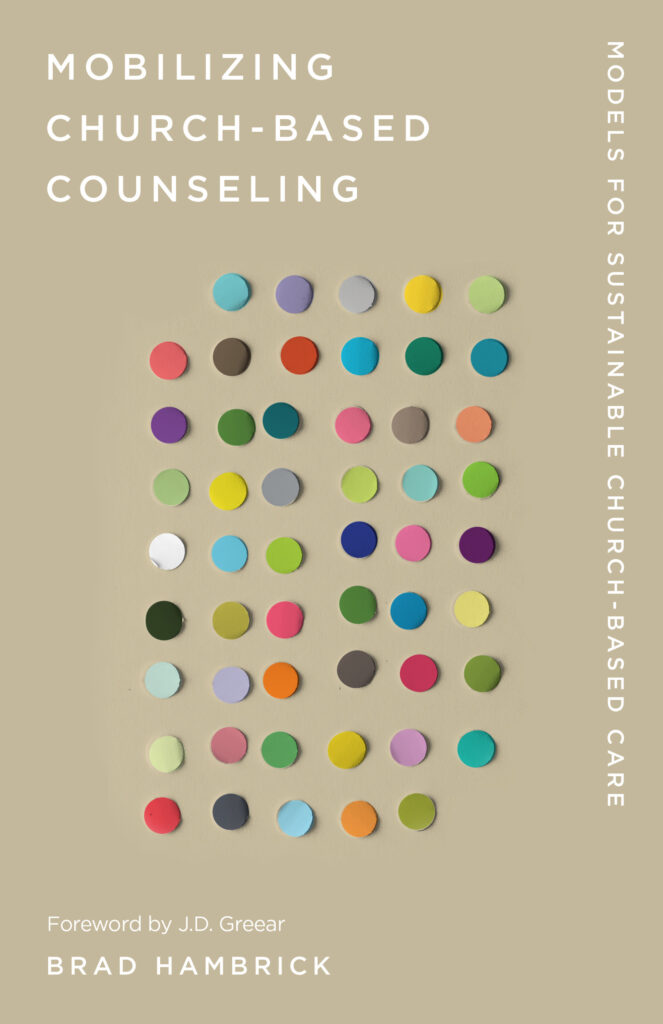Have you ever walked up to a Coke machine only to find Pepsi products, bottled water, or Gatorade? What is going on when this happens? No one would drive up to a Chevrolet car dealership and call it a Ford lot. But we do that with Coke machines. Why?
Regardless of the type or brand of beverage in the vending machine, it is commonly called a Coke machine. Culturally, the brand become so strongly associated with that product that few people remember, much less use, the term “vending machine.”
Just like with vending/Coke machines, the term “counseling” has come to refer to a broad variety of helping conversations, especially in churches. We have camp counselors in student ministry, prayer counselors after service, we highlight the way that small group members counsel one another through hard times, and we encourage people to seek counseling from their pastor.
Is it bad to call these forms of care counseling? Before your church has an established counseling ministry, this terminology is fine. Where there is no real cause for confusion, there is no need for greater clarity. But after your church starts a counseling ministry, you will want to be more precise in how you refer to these other forms of congregational care. People will be reticent to participate in a new “counseling” ministry when the term is unclear.
When you add an official counseling tab on your church website, it introduces new questions that require more clarity. If counseling is still ambiguously defined as “every helpful conversation,” church leaders are left wondering, How is this ministry different from what we’re already doing? Church members wonder, Am I going to be paired with a friend, a small group leader, a pastor, or someone with more advanced training? Area counseling professionals wonder, How is what this church offers similar or different from what we do?
Having a counseling ministry invites people to share vulnerable details of their life with someone they do not know well. That kind of invitation necessitates greater clarity.
You wouldn’t invite a group of children to a sixth birthday party and set out spelunking equipment without clarifying with parents what was going to happen. Similarly, as churches, we should only offer an invitation for people to share their most painful and private experiences if we also provide a clear explanation of who their care provider is and what makes this ministry different from casual conversations with friends. You should have clear answers to the following questions:
What kind and how much training will my counselor have?
Using the term “counselor” by itself implies the person is a mental health professional, especially if someone completes intake forms before meeting with a counselor. As churches, we need to honor those we serve by being clear regarding the training of those we call counselors.
Who at the church will have access to what I share in counseling?
In churches that are led by a plurality of elders, it is easy for church leadership to assume that information shared in counseling will be shared amongst the elder team. Counselees generally do not view information shared in counseling as appropriate to share without permission.
What will be expected of me in the counseling process?
Churches are communities. That means churches have instincts to think with a collectivist mindset toward care (confession, accountability, support teams, etc.). Most counselees think of counseling in individualistic categories (i.e., private meetings bound by confidentiality in which dual relationships are avoided). These expectations need to be clear before counseling begins.
Questions like these may feel daunting to church leaders thinking about starting a counseling ministry. That happens every time a church engages in a new ministry endeavor. Think of the church that decides to host their own youth camp instead of taking students to a camp hosted by a larger organization. This church faces lots of new concerns and questions as they prepare to take this step.
The questions above, which are not an exhaustive list, represent the kind of new questions and concerns that emerge when a church decides to launch a counseling ministry. The questions may be intimidating but that doesn’t make the questions bad or inappropriate.
If you would like to learn more about what it would look like to add a more formalized counseling ministry to your church’s existing one-another ministry and pastoral care efforts, consider reading Mobilizing Church-Based Counseling. Get to know the terrain and options that exist for church-based counseling. Gain an understanding of the implications that accompany implementing each option well.
In the same way that it is unwise to buy a car without test-driving several options or to buy a home without visiting several houses, your church needs to explore several options for what a counseling ministry might look like before committing to one. Invest the time to do so. Those you serve and those who serve in the counseling ministry you decide to launch will be grateful you did!
Mobilizing Church-Based Counseling
Many churches would like to start a counseling ministry, but they don’t know where to start. Mobilizing Church-Based Counseling offers direction to churches for creating a ministry built around lay-led counseling groups and mentoring. Based on proven models used in his own congregation, Brad Hambrick lays out a clear plan to launch a sustainable soul-care ministry that can be replicated in churches of any size.






